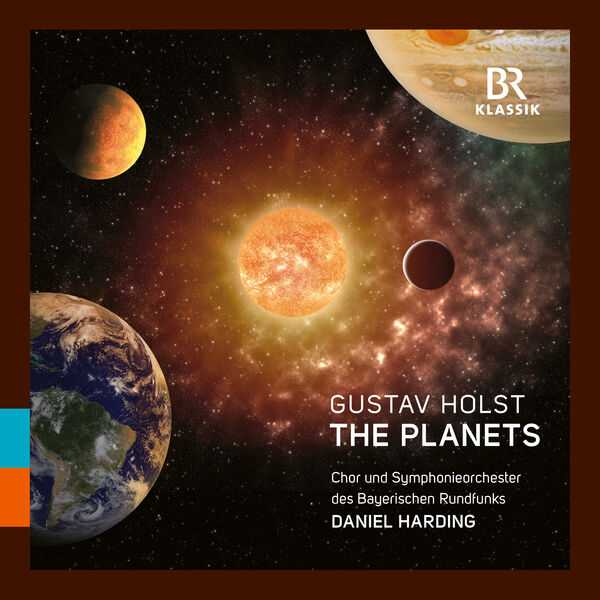

Composer: Gustav Theodore Holst
Performer: Chor des Bayerischen Rundfunks
Orchestra: Symphonie-Orchester des Bayerischen Rundfunks
Conductor: Daniel Harding
Format: FLAC (tracks)
Label: BR Klassik
Catalogue: 900208
Release: 2023
Size: 547 MB
Recovery: +3%
Scan: yes
The Planets, Op. 32
01. Mars, the Bringer of War
02. Venus, the Bringer of Peace
03. Mercury, the Winged Messenger
04. Jupiter, the Bringer of Jollity
05. Saturn, the Bringer of Old Age
06. Uranus, the Magician
07. Neptune, the Mystic
“Seven musical character images – each one immensely sensual and expressive, and standing on its own like a monument. The British composer Gustav Holst, fascinated by (esoteric) astrology, chose the planets of our solar system and the characteristics attributed to them as the basis for what he referred to as musical “”mood pictures”” or “”embodiments””. Ultimately, the seven movements of his orchestral suite “The Planets”, op. 32, composed between 1914 and 1916, can also be understood as general explorations of human traits. The work had not been performed by the Bavarian Radio Symphony Orchestra for almost three decades when, on February 25, 2022, the British conductor Daniel Harding brought it back to Munich’s concert audience in the Herkulessaal of the Residenz, and with great success. During a trip to Mallorca in the summer of 1913, Holst’s friend Clifford Bax introduced him to astrology for the first time and the composer immediately began to draw up horoscopes for himself and his acquaintances. The extent to which he actually believed in the influence of celestial bodies on personality formation played only a subordinate role here; it was the notion of a holistic system that could encompass both man and the world that fascinated him the most. His interest in astrology also offered him a welcome break from the monotony of his life as a teacher – at St. Paul’s School for Girls and at Morley College, where he taught working-class adults.
A first (private) performance of the orchestral suite took place on September 29, 1918 at the Queen’s Hall in London, with Adrian Boult conducting. Public performances of individual movements followed. A few months before the first public performance of the complete work, presented by Albert Coates and the London Symphony Orchestra on November 15, 1920, Holst revealed its cosmic subject. Before then, only the initiated knew what lay behind the rather cryptic movement designations. At the premiere it was above all “”Mars, the Bringer of War”” that struck a chord with a nation traumatised by World War One. Remarkably, Holst had already written this first movement of his suite in the summer of 1914, when the countries of Europe were still merely engaged in patriotic sabre-rattling. His clear-sighted portrait of the destructive machinery of war – in the relentlessly repeated 5/4 march rhythm – runs counter to the positivist characterisation of “”Mars the Warrior”” in conventional astrology.”
Gustav Holst recorded The Planets twice as a conductor, with the duration of the work coming in on either side of 43 minutes. Later conductors have taken it a good deal more slowly, and it is possible that Holst’s quick tempos resulted from the need to reduce the number of 78 rpm records required. However, perhaps nobody has taken The Planets as slowly as Daniel Harding does here, leading the Chor und Symphonieorchester des Bayerischen Rundfunks; the album comes in at 56 minutes and 48 seconds. Harding’s approach has two consequences. First, he tends to emphasize the work’s mystical aspects. The military march sounds in the opening movement, “Mars, the Bringer of War,” have less of the ferocity that audiences recently emerging from World War I must have found so compelling, but “Neptune, the Mystic,” the finale, here achieves a near-Mahlerian transcendence. What makes it work is the superb playing of the Symphonieorchester des Bayerischen Rundfunks, which steps up to the considerable challenges the work poses at this speed. The extensive brass writing, the string harmonies at the top of the fingerboard, the 18-player percussion section, and the wordless female chorus trailing off at the end: all are pristine. This is all the more impressive given that, aside from Herbert von Karajan, Holst’s tone poem is not so often programmed in Germany. The last performance by the Symphonieorchester des Bayerischen Rundfunks took place more than 30 years earlier, and this complex score was surely unfamiliar to many of the musicians. The sonic clarity achieved by the engineers of the symphony’s in-house BR Klassik label is superb. All in all, this is an entirely distinctive and beautifully executed reading of The Planets.